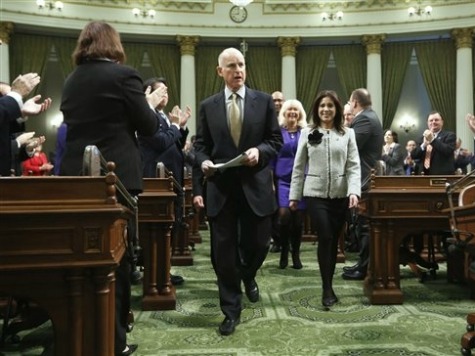This year Californians are going to pay a steep price for their decision to lock in one-party governance in their state government. You see, Governor Jerry Brown, a Democrat, has introduced revisions to his proposed budget for fiscal year 2014-2015 that, if adopted, would increase spending year-over-year around $12 billion dollars more than last year and would result in the largest state budget in California history.
Under Brown’s proposed budget, spending would increase to a staggering $156 billion ($107.8 billion of that being for the state’s General Fund).
Other than carrying over a vast number of big spending programs that are already in place, the Governor goes “all in” for funding high-speed rail–a program unpopular with voters because of its increasingly steep price tag–and over a billion dollars in increased spending for government-provided health care services, and much more.
The Governor justifies this proposed increased spending based on an unanticipated increase in tax revenues.
State Senator Republican Leader Bob Huff succinctly dispelled the notion of any real surplus: “One thing is clear - there is no budget ‘surplus’ in California. When you have identified over $340 billion ofstate debt and unfunded liabilities, as the Legislative Analyst has, you cannot claim to have surplus revenues.”
Huff soberly points out that the debt load “is nearly $9,000 for every single Californian.”
While Brown’s budget revisions do include some relatively modest payments towards debt and unfunded liabilities, they are hardly enough to address the magnitude of that problem.
It is also noteworthy that all of the increased revenues to state government did not really appear out of thin air but as a result of massive new taxes approved by California voters in 2012. Proposition 30, which was approved by a 54%-46% vote, hiked state income tax rates for those earning more than $250,000 a year, and increased the state’s sales tax rate by a quarter cent.
On the campaign trail back in 2012, the Governor said about Proposition 30: “It’s about taking money from the most blessed and giving it to the schools.”
At the time, Joel Fox, President of the Small Business Action Committee, which opposed the ballot measure, presciently pointed out that Proposition 30 was “a shell game” and noted that the ballot measure was “built on false premises” because money raised from the taxes would not be earmarked specifically for education.
Of course, no one in state government is suggesting that repealing the apparently unneeded tax increases would be a goodidea–even though they were passed under a false premise.
It is not likely that voters would have passed the tax increase if they knew revenues would increase without them, or that the funds would be used for a bevy of expenditures that were unrelated to school funding.
And while Governor Brown is calling for billions in increased spending, his fellow Democrats in the state legislature are critical of his proposal because they say it doesn’t increase spending enough.
Seriously.
This week, Senate President Pro-Tem Darrell Steinberg expressed concerns over Brown’s proposed budget revisions, saying, according to the Sacramento Bee, that Brown’s revised state budget doesn’t do enough to acknowledge the Californians who have been damaged by years of programcuts.
Steinberg’s “wish list” of additional spending includes even more funding for Medi-Cal, public universities, and, of course, his own pet project: creating a new statewide pre-school entitlement program. These carry price tags of hundreds of millions of dollars annually.
Missing from the debate in the State Capitol, in any substantive way, are those who would actually call for cuts in state spending on programs; increases in payments to reduce the state’s debt and unfunded liabilities; and placing before voters an opportunity to end the recently enacted income and sales taxes, currently set to sunset in 2019 and 2016, respectively.
Californians passed a ballot measure a few years back that, while sold as a measure to penalize legislators for not passing a budget by the Constitutional deadline, actually reduced the vote threshold needed to pass a state budget from a two-thirds to a simple majority.
Since Democrats have majorities in both the State Senate and the State Assembly by significant majorities what once were bipartisan budget debates are ultimately worked out behind closed doors. Republicans in the State Capitol can shout from the rooftops, but there is little incentive for the extremely liberal legislature to pay them any heed.
It doesn’t take a rocket scientist or a calculator to figure out that if the governor is calling for massive spending increases, and legislative Democrats are calling for even more, that government spending will only be going in one direction this year–and that is straight up.
As the saying goes, elections have consequences. In California, expensive ones.

COMMENTS
Please let us know if you're having issues with commenting.